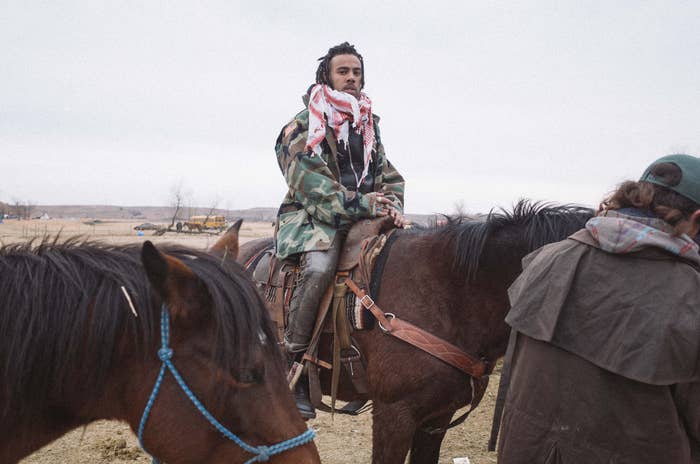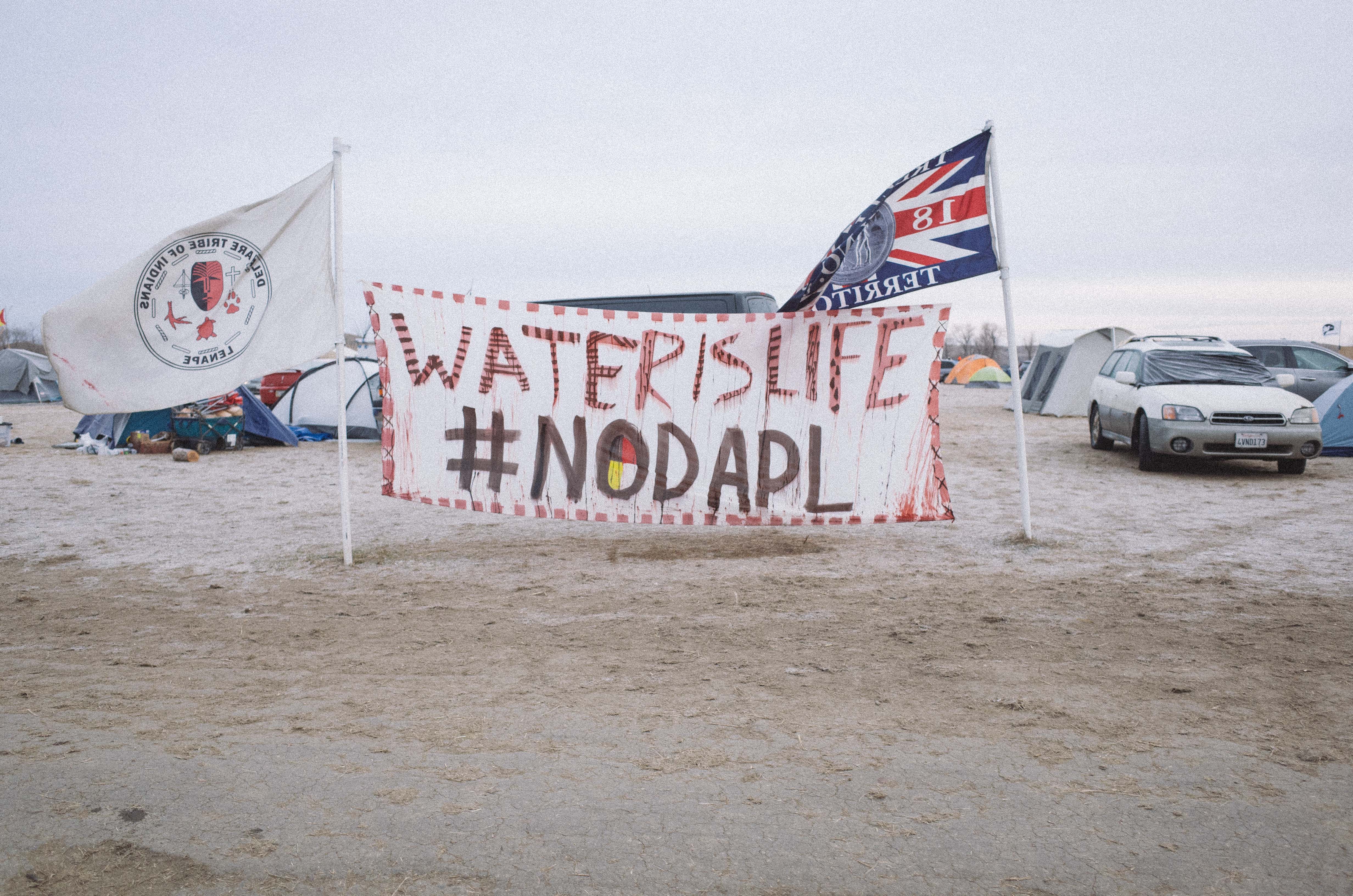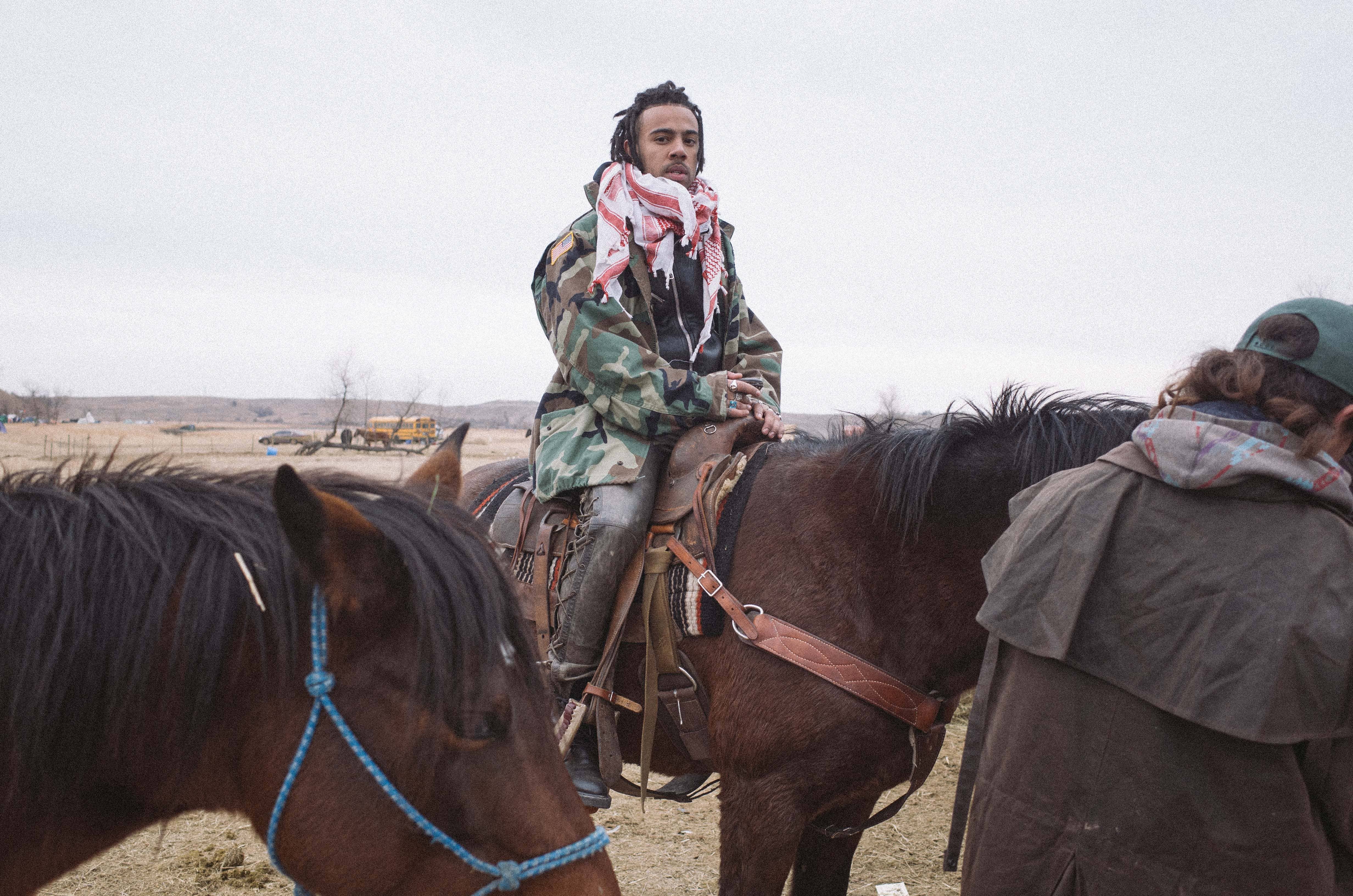
Tens of thousands of people have used Facebook to “check in” at the Standing Rock Indian Reservation in recent week, but Chicago rapper Vic Mensa actually visited North Dakota last week to participate in ongoing efforts to protect the water supply of the Standing Rock Sioux Tribe from potential contamination by the Dakota Access Pipeline.
The DAPL, if you don’t know, is a $3.8 billion, 1,134 mile-long pipeline that would run oil underground from North Dakota to Illinois. The conflict over the pipeline is because it’s set to be constructed just north of Sioux land and the Standing Rock Indian Reservation near Cannon Ball, North Dakota, which is home to just over 8,000 people.
For months, the Standing Rock Sioux have objected to the pipeline due to its potential hazards and encroachment on their land. They’re asking that Energy Transfer Partners, the company behind DAPL reroute the pipeline or halt its construction altogether. They’re also asking for the U.S. federal government’s assistance in resolving the matter.
So far, there hasn’t been much attention to the situation at Standing Rock, despite what seem to be human right violations by law enforcement agencies that are policing the construction site. Law enforcement has firing rubber bullets at “water protectors,” deployed tear gas, and sprayed water cannons at them in freezing temperatures in recent weeks. And just Friday, the Army Corps of Engineers issued a statement to those at Standing Rock telling them that they had until December 5 to leave.
Mensa spent the weekend after Thanksgiving standing in solidarity with water protectors from all over the globe who are attempting to block the construction of the DAPL and, despite the ultimatum from the Army Corps, he plans to return December 4 to continue the fight. Complex caught up with Mensa after he returned from his trip Standing Rock to find out what he heard, saw, and felt.
COMPLEX: What made you want to go to North Dakota to join in the direct action at Standing Rock?
What’s going on in Standing Rock is an extreme human rights violation and I feel that as a black man in America, a member of a very oppressed group, it’s important to show solidarity with other oppressed groups. And Native Americans are arguably the most impoverished and disenfranchised group in this nation.
We have a situation here that is basically like Flint, Michigan before the water was poisoned with lead, so we have an opportunity to preemptively defend the human rights of people that have an inherent right to this land. That inspired me to go to Standing Rock.
How did you learn about the situation there? Most news outlets haven't exactly covered it a lot, so how did you first find out about what's going on?
I found out through a friend. Like you said, the media has almost blockaded the coverage of Standing Rock.
The experience was very profound. There are some people with incredible resolve down there, weathering the blistering cold and snow to defend the livelihood of the native people.
You have big oil money interests funding so many different parts of this system. The media being a major one. I think that's why the media’s been so absent in the situation and why the government’s been so absent in the situation, because our nation is not really controlled by politicians, it’s controlled by the corporations. They lobby and propose a lot of the laws that oppress people nationwide for their gain. That's why it’s important that we use our alternative platforms to publicize what's going on.
The destruction of native people has been going on since before this was even a nation—since Christopher Columbus first landed on this side of the world. You’re not dealing with the same type of invisible people anymore. And now that we have the ability to broadcast what's happening in our communities, with or without mainstream media support, we have to do just that.
How long were you in North Dakota? How did you get there?
I was in North Dakota for three days. I’m back in Los Angeles now and planning a trip back for the weekend. I got there on a plane, drove a couple hours to the camp. Now they’re saying it's a lot more difficult to get into the camp because the governor shut off all emergency and municipal services for they're not plowing the roads anymore—you have a huge conspiracy in the political system to protect the oil interests. We’re still working around it, though.
What was the experience like?
The experience was very profound. There are some people with incredible resolve down there, weathering the blistering cold and snow to defend the livelihood of the native people. There are just generations of warriors from the native tribes that are there—all the way from 15-year-old kids who’ve been wrongfully charged with felonies for nothing more than trying to defend their land and water source to 60-year-old women who have been fighting for these things for decades.
It’s very peaceful. They’re essentially just organizing in numbers and just praying. There’s a lot of praying going on. So it’s crazy when they’re depicted as violent and being disruptive and starting riots because they’re literally praying in the face of heavily armed militarized police and actual U.S. Army soldiers. It's domestic terrorism 100 percent by the United States government. It's complete domestic terrorism and its environmental racism. The pipeline was originally supposed to be run through an area near Bismarck, North Dakota which is a primarily white area and it was deemed as too dangerous for the natural resources of those people and so they moved it to Indian Country because America doesn't value those people or doesn't value the Native Americans. So that's why we're saying no, this is wrong. And as the people of this nation, were not going to stand for that.

The people down there are showing such commitment and such strength and on the other side of things, the militarized police are showing such disregard, disrespect, and contempt for the lives of the native tribes. The police are completely militarized. There are tanks, armored Humvees, so-called non-lethal weapons that they’re using: rubber bullets, and concussion grenades, that are still dangerous enough to have blown the bones out a woman’s arm, who was down there with the water protectors. They are shooting people at point-blank range with rubber bullets. There’s even chemical warfare. They have planes flying overhead dropping chemicals on people in the camps, putting them into fits of asthma. They're jamming phone signals. You'll be trying to Facebook Live or stream things from your phone and your phone will just keep cutting off and going to black, coming back on. Sometimes, on phone calls, you can just hear it distorting in ways that are clearly manufactured. They’re trying to cut off all supply to people down there. It’s so illegal what they're doing.
It’s so illegal and it has no consideration for the treaties that, by American law, make this Indian country. They make this native land. Obviously, this whole nation is native land—inherently—but even by American law, this is completely native land. The conspiracy by all branches of government to destroy these people for the profits of the oil companies, it’s astounding. There are so many human rights violations that they are engaging in to defend this oil money. It's disgusting.
Have you been able to connect with native people who are there defending their land?
I learned so much from the native people down there. The entire experience is a real spiritual one. What the native people understand and have understood for tens of thousands of years, before the western world ever dreamed of making this nation, the United States of America, what they understand is the commitment to the earth, the land, the water, the air, is so paramount to our survival as human beings.
What we want down there is for the government and President Obama to honor the United States treaties and to stop the pipeline from being built under their water source and through Indian Country...
Our society has so much to learn from them. The way that the American society has dealt with them has had such disregard for the knowledge that we need to be taking and learning from them. This land that the U.S.A is ignorant and entitled enough to even give to its inherent owners is being split into individual tribe members with a cap of like 40 thousand, 50 thousand acres with complete disregard for the fact that that's not even how these people view land. The don't see land as a thing being owned by one person. They're a lot more focused on necessity than want. This is a situation of greed on the part of capitalist America and a complete lack of understanding for the way that these people have used land, lived off the land, and given back to the land since the beginning of it. Americans want to come in a soak every little piece out of every plot of land that they can until it's useless to the world and that’s not the way the native people view the earth.
It's not sustainable.
It’s not sustainable at all. So what you have here is, first and foremost, a protection of native sovereignty and a demand that the United States respects their lives. Second of all, the beginning of a clean energy revolution because it’s not sustainable at all to keep sacrificing clean water and fertile earth and breathable air for short term profits on behalf of billion dollar corporations
How is the vibe there different or similar from what you’ve experienced protesting in Chicago?
I think that there is a different sense of structure in the native resistance. They have a real connection to their elders and a power structure not just based on money, but based on experience and that’s admirable because there’s not a lot of structure and not a lot of experience in a lot of the movements in America because our leaders have been taken out and killed for decades and removed from the community.
How might it be similar to the protest that you took part in Chicago, are there any similarities between the two struggles?
I think there are so many similarities. I feel like this is Flint before it happened. I feel like this is Ferguson, this is Chicago with Laquan McDonald, this is Alton Sterling in Baton Rouge. This is transgender bathrooms in North Carolina. There’s every hallmark of every civil rights issue that the black American people have been battling for 100 years, since they were freed from slavery.
You have American disregard for the lives of these native people the same way they have a disregard for young black men and women. The same way black people are being killed by the police in the streets every day, Native Americans are actually the demographic most likely to be murdered by the police. They are by far one of the most oppressed groups if not the most oppressed group in the nation. America was built on their genocide. What you have here is just America trying to continue that path, and continue that pattern of destroying native people. The same way they've been doing to people of African descent since the birth of the nation.
What are the goals of the protest for those who don’t know? Obviously, they want to stop the building of the pipeline, right?
You have the Dakota Access Pipeline that the oil company is trying to run under Lake Missouri that provides drinking water to the Standing Rock reservation and millions of people—natives and non-natives. This pipeline was deemed too dangerous for white areas of North Dakota so it was put into Indian Country. But it was by treaty, the Fort Laramie Treaty of 1851, that this land belongs to the natives. And the water protectors is what they call themselves, not protesters because they don't want this to seem like a partisan or just a political issue—this is a human rights issue. They’re trying to protect their water source.
THERE'S A LOT THAT YOU CAN DO IF YOU'RE NOT ABLE TO MAKE IT DOWN THERE PHYSICALLY.
What we want down there is for the government and President Obama to honor the United States treaties and to stop the pipeline from being built under their water source and through Indian Country, because it’s illegal and so dangerous for the lives of so many people.
Do you have any final thoughts you want to share with Complex readers about your experience, any takeaways?
I’ll say that you have a lot of people in this nation who are very upset at the current direction of our government—with the election of a racist, bigot, Islamophobe, liar to our highest office. What’s happening is Standing Rock is our first opportunity to really exercise our power as the people of this nation.
I’m seeing how disgusting this whole conspiracy of government against these people is. They're taking political prisoners. They’re employing chemical warfare against citizens of the United States. There’s a woman named Red Fawn—free Red Fawn, by the way—who has been in prison for over a month. She’s a medic that was providing medical attention to people on the front lines protecting the water from the militarized police and she was grabbed by the police—this is all on video. She was shot three times with rubber bullets at point-blank range with ten men kneeing her head into the ground, had her eyes blacked out and has been locked up for the last month—all without proper representation, just for providing medical attention. It's real political prisoner shit.
One of the biggest takeaways that I left with is just the strength and resolve of these native people and how inspiring it is and how necessary it is for all of us outside of Standing Rock to support the people at Standing Rock. Just to continue to publicize Standing Rock, people can call the White House and demand Obama take executive action to stop this pipeline through their water source. You can also donate at StandingRock.org, money that can go to resources, and to legal fees for all of the people that are being wrongfully charged with felony crimes. There's a lot that you can do if you're not able to make it down there physically.

